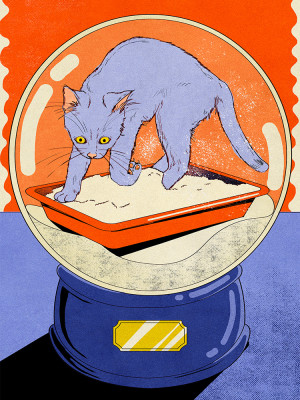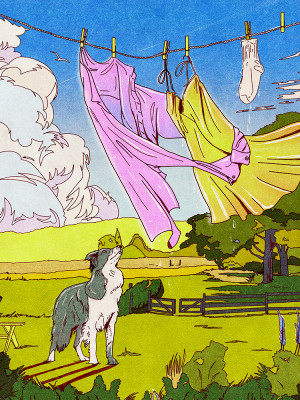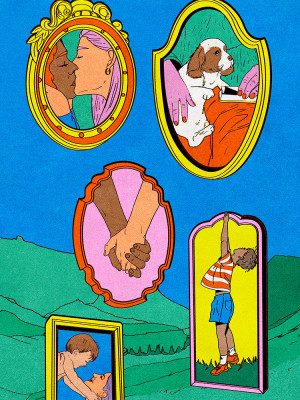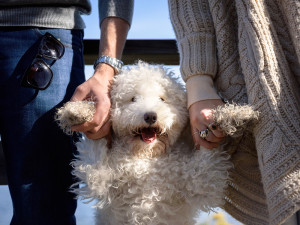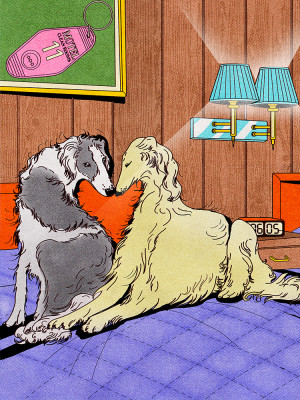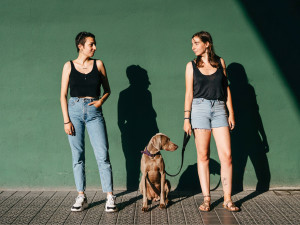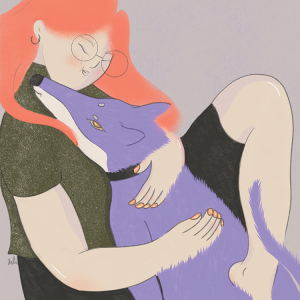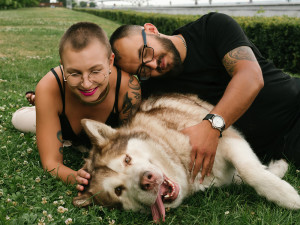Does Your Dog Hate When You and Your Partner Fight?
Here are the signs they’re trying to get you to stop.
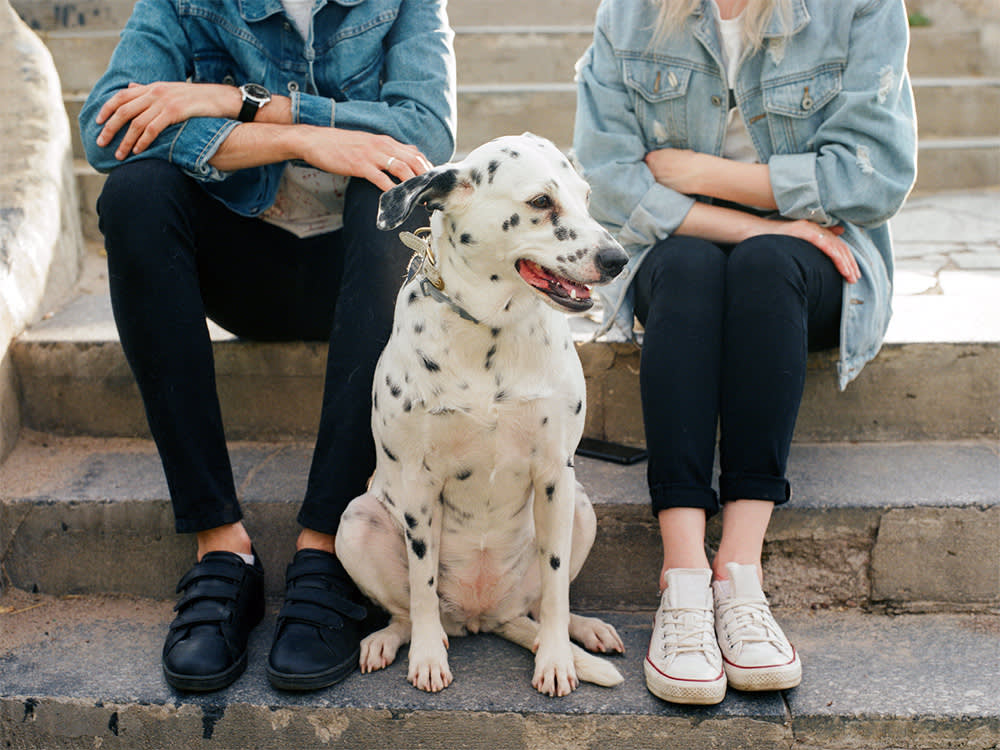
share article

Your pet wants you to read our newsletter. (Then give them a treat.)
Heavy Petting is a weekly column full of relationship advice for pet parents — so you and your boo don’t end up fighting like cats and dogs over the cat and dog.
Of course, my partner and I have a perfect relationship in which there has never been one fight, argument, squabble, spat, or disagreement — not ever, not even once. But (cough) if we had, our dog Finn was certainly there because he lives with us and generally likes to follow us around.
In the past, when Finn has witnessed us fight, he’s often acted as a sort of pressure release. He’ll sit down on one of our feet, bop the back of our knees with his nose, and lie down next to us. So, we’d both go to soothe him or play with him and tell him, “It’s OK; the dads are just sorting something out.” Upon reflection, these little loving interludes to calm the dog would help us to — in the parlance of therapists — “de-escalate.”
I’ve sometimes wondered how much I was projecting a peace-keeping instinct onto the dog, where he was most likely just confused. How much could a dog really understand about humans arguing?
Your dog is somewhat of an empath.
“Understand” is perhaps overstating it. But dogs do pick up on the vibe during a fight between humans. “Dogs have something called emotional contagion,” says Brett Bailey, a dog trainer and founder of Who’s A Good Boy Industriesopens in a new tab, “They can actually sense and feel our emotionsopens in a new tab, but they do not understand them.” Bailey notes dogs will most likely pick up on something important to their situation, like a decrease in stability of their environment.
Mitchell Stern, a dog trainer with Yes Dog Trainersopens in a new tab, adds to this, reminding us that “dogs can smell aggression, fear, anger, etc., in humans.” And fighting can absolutely stress your dog out. Stern mentions an increase in FAS (fear, anxiety, and stress)-related behaviors — especially if they witness fighting a lot.
Dogs can act out to solicit attention and connection. Plus, he adds: “If the dog has bonded more with one person than the other, there may be some resource-guarding if the dog perceives the stress as a threat to their bonded individual.”
Bailey brings up a solution that might mitigate some of the dog’s responses. He recommends something “to provide your dog enrichment opens in a new tabor biological fulfillment,” like a decompression walk, a licking mat, or something to chew.” Or you could send the dog into the yard (if you have one), “especially if your dog is fearful, or timid and sensitive to unpredictable movement and sounds.” You could also engage in some quality time with the dog after a fight — all together as a family — playing or walking.
Still, you can’t really hide emotions from them, Stern notes: “Keep in mind that the human smell of love and waropens in a new tab are discernible by dogs.”
Now, if they’re picking up on this peppery fighting energy — even if they don’t understand the social nuances — should you try to evidently repair these vibes and make up in front of the dog, like parents would in front of their kid? Well, it probably won’t work as well, Bailey says: “A dog does not have the cognitive flexibility to process make-ups and break-ups.”
Your dog is a mini relationship counselor.
During tense moments, my partner and I are definitely guilty of trying to mask what’s happening and faking that we’re happy in the moment. But even if that charade does nothing for Finn, who still makes his presence known as we’re talking, it does actually give us a much-needed little break from our spat. We focus our attention on him, and not our fight, so what starts as a made-up truce for Finn’s sake can actually led to a real solution to our conflict.
A friend of mine mentions that she and her boyfriend would stage-whisper when they were fighting, “as if the dog wouldn’t hear it, when like, doesn’t the dog have 9,000 times better hearingopens in a new tab than we do?”
Their dog was also in the habit of bringing them his toys when he thought they were upset. “I have a vague memory of us fighting in the kitchen, and he was repeatedly pressing a plush avocado onto my thigh,” she says. “I remember it was an avocado, but I could not tell you what we were arguing about.”
Bailey says this kind of situation happens a lot. “It is not uncommon for a dog to attempt to de-escalate a person who is more animated and hostile,” he says.
So, there you have it. When I was worried that our fight had stressed out or confused Finn, he was hard at work with his own version of the argument-diffusing avocado method by getting in our way and wagging his cute, furry tail. The next question is: When did he get his degree in counseling, and whose money did he use to pay for it?

Maggie Lange
Maggie Lange is a writer, editor, and columnist. Her work has been featured in New York Magazine, Vice, Guernica, GQ, Rolling Stone, Pitchfork, Elle, and Bon Appetit. She lives in Philadelphia with her favorite brindle boy, Finn.
Related articles
![an illustration of a couple kissing, a dog, a couple holding hands, a child, and a child playing with a dog]() opens in a new tab
opens in a new tabIs Raising a Dog With Someone Anything Like Raising a Kid Together?
It’s the great puppy versus baby debate.
![Couple each holding the paw of their white fluffy dog]() opens in a new tab
opens in a new tabWho Keeps the Dog in a Divorce?
Legal experts weigh in on developing pet custody issues.
![An illustration of 2 dogs on a bed]() opens in a new tab
opens in a new tabThree’s a Crowd: When One Partner Doesn’t Want the Dog in the Bed
You want them to cuddle up, your S.O. doesn’t. Here’s how to handle the great bed debate.
![Lesbian couple with a dog]() opens in a new tab
opens in a new tabWho Gets the Dog in a Breakup?
If the “Great Divorce” is coming, how should you handle custody battles and co-parenting your pet in a split?
![Illustration of a woman hugging a dog]() opens in a new tab
opens in a new tabIs That...Stress Your Dog Smells?
A 2022 study finds that your pup can tell — er, smell — when you’ve been doom-scrolling.
![Couple lies on the grass with their Malamut dog in the park]() opens in a new tab
opens in a new tabHow to Woo Your Way Into Your New Partner’s Pet’s Heart
Meeting your new partner’s pet is an honor — winning them over is another story. Here are some tips for being friends with your significant other's best animal pal.


